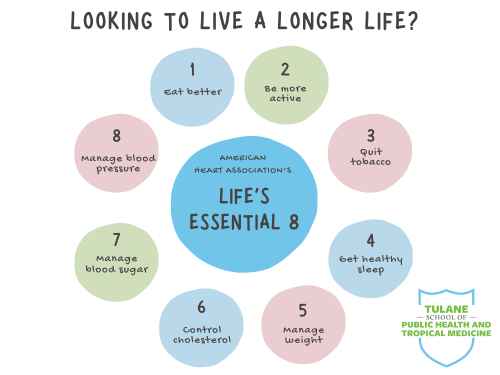New Tulane SPHTM research reveals link between healthier lifestyle choices and a longer life

What is the secret to living a longer life?
It’s a compelling question. And thanks to a new Tulane School of Public Health and Tropical Medicine-led study published in Circulation, the numbers provide a fairly stark answer.
The American Heart Association’s Life’s Essential 8 provide a template for healthy living and a stronger heart, and as it turns out, that guidance is a roadmap to a longer life.
In the new study, participants who adhered to the AHA’s Life's Essential 8 had an average of 8.9 more years of life expectancy at age 50 vs. those who didn't.
Previous studies only linked healthier lifestyles with healthier hearts and an avoidance of chronic disease -- not longer lifespans.
The new research indicates "that you can modify your lifestyle to live longer," said lead study author Dr. Lu Qi, a professor of epidemiology and director of the Tulane University Obesity Research Center. “Our study is the first to report the relation between these new metrics and predicting life expectancy, how long you can live,” he added in an interview with WWL.
So, what are the Essential 8? The AHA outlines the factors as follows: Eat better, be more active, quit tobacco, get healthy sleep, manage weight, control cholesterol, manage blood sugar, and manage blood pressure.
Qi, with Tulane colleagues Hao Ma, Xuan Wang, Qiaochu Xue, Xiang Lee, and Yoriko Heianza along with researchers from Zhejiang University and Utrecht University, pulled data from the 2005-18 National Health and Nutrition Examination Survey (which had over 23,000 participants, aged 20-79) and linked it to the National Death Index.
Using a 100-point scale, participants were assessed scores for each of the Essential 8 categories, as well as an overall score. Higher scores were associated with a longer life.
Among the individual categories, sleep, tobacco use, physical activity and blood sugar had the greatest impact on a great life expectancy.
“That's huge. That's considerable ... nearly nine years longer if they keep their heart healthy,” Qi said.
